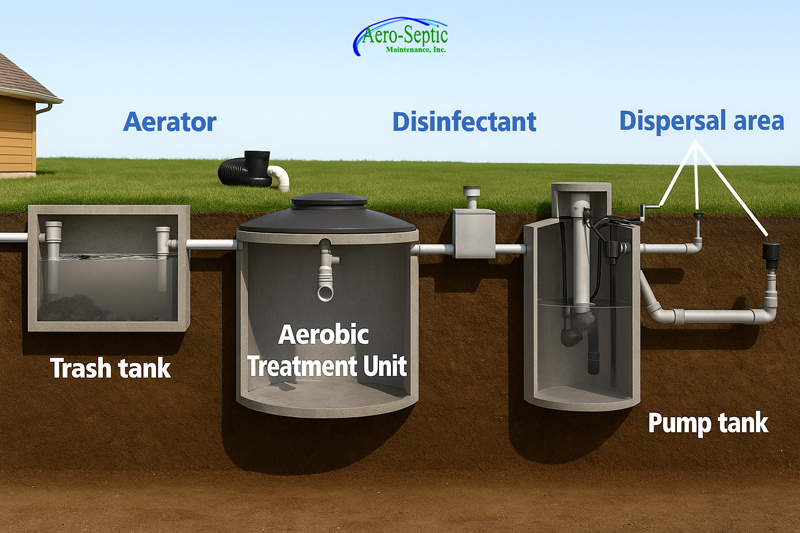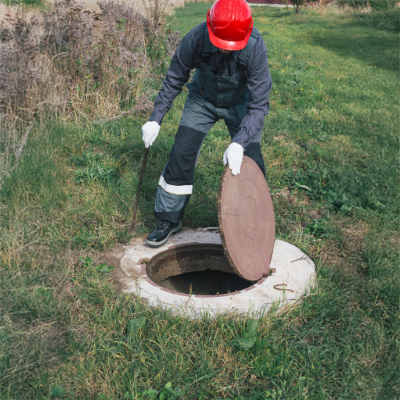Septic 101 – Aerobic Septic System
Many homeowners are new to the whole "septic system" experience. You are responsible for getting the septic designed, the permits, having the system installed and maintained. Do you know the State laws and regulations for your septic system? Did your maintenance provider schedule a meeting with you after installation to go over the system and explain how your system works and your responsibility as the property owner? Just in case, here is a refresher course– Septic 101:
The County Environmental Department is responsible to the state, as the permitting authority for legal installation and maintenance of septic systems. Before you can build, you must pull a building development permit from Road & Bridge. Then you must have a professional engineer or Registered Sanitarian do a soil analysis and design your septic system based on the square footage of the home, number of bedrooms (if it has a closet, it's a bedroom) and the number of people in some cases, the design along with the soil analysis, site evaluation and floorplan must be submitted to the county for approval, once the paper work is approved you receive your septic permit. You will not be able to get your septic permit without your development permit from Road & Bridge. State law requires the installer to be licensed with the state as well as be a certified maintenance provider, or work with a maintenance company that is state certified, to include a two year maintenance agreement with the installation, after that it is up to the property owner to obtain a yearly maintenance contract. All counties, by law, require your septic maintenance company to inspect and maintain your "Aerobic" system on a regular basis. A copy of the results from all inspections is given to the homeowner and a copy is sent to the County to keep on file.
After two years, it is the homeowner's responsibility to contract a company to maintain their septic system. Be sure that your maintenance company is a state certified maintenance provider and is certified by the manufacturer of your system. A complete list can be found on the Counties website.
Schedule Your Septic Service Today
Call (281) 351-9681 or
Get a Free Quote
If you do renovations to your home that increases your water usage or change the footprint of your structure, or if you add a swimming pool, or storage building, you may need to get a new septic design. For instance, the diameter of the outside spray area of your system must be 25 feet from your swimming pool. So you may need to move your existing spray heads. If you have a landscaping company installs a sprinkler system you need to make sure it does not interfere with the septic system. Under no circumstances can a landscaping company replace septic spray heads with theirs. Septic sprinklers are by state law, required to be purple so that it is obvious that they are used for sewage.
So, what happens if you don't have a maintenance contract? Or what if you had a contractor but the company never performed the State inspections? You will receive a letter from the County, if you do not get a contract, you will be sent to Justice of the Peace Court. How would the County find out that you haven't maintained your system? Well, it wouldn't take long for everyone to know. The smell would give you away. Or your neighbor may notice that your spray heads are spraying during the day and your alarm will be going off and annoying your neighbors. Many things could happen that would alert you and your neighbors that there is a problem. When the County is contacted with a complaint, they will look up your reports and contact your maintenance provider to go out and check your system. If the county discovers that you don't have a maintenance provider, then the homeowner is given ten days to sign a maintenance contract and fix the problem. If not, the homeowner will be filed on in Justice of the Peace Court.

The County also does random maintenance checks. They will randomly pick an area and send out Designated Representatives (DR) to check each home in that area. The DR will check your system to be sure that the maintenance tags are up-to-date. If they suspect a problem with your system, they may turn the system on to make sure it operates properly. Maintenance companies are required to bring repair issues, such as a broken sprinkler head or pump, to the attention of the homeowner. The law requires that homeowners pay for the repair. If the homeowner refuses, the maintenance company must alert the County, who in turn sends out a 30 day notice to the homeowner to make the repair. The County may file a probable cause in Justice of the Peace Court if the repairs are not made.
Last but not least, Chlorine tablets or liquid chlorine are required to be routinely added to your septic system. Based on the usage of your system, you may need to add chlorine monthly. Adding chlorine is the responsibility of the homeowner. Chlorine tablet dispensers for sewage treatment and liquid chlorinators which use household bleach are the only approved methods for the treatment of the bacteria in sewage. Many of you may not realize that an Aerobic Wastewater Treatment Plant is a "living" machine that houses a micro-organism "bug colony" that consumes organic waste. These micro- organisms require oxygen and appropriate "food" (organic waste devoid of toxins) to survive.
The following DOs and DON'Ts should be practiced to insure your system performs properly.
- Medicines: If anyone in your household is ingesting strong medicines; antibiotics, chemotherapy or other, the health of your "bug colony" may be jeopardized.
- Do not dispose of grease, fats, and oils.
- Do not dispose of pesticides, herbicides and other toxins.
- The garbage disposal should be used sparingly. Food waste, grease, etc. should be disposed of in the solid waste bin. Food waste represents additional loading the Aerobic Treatment Unit. The system would have to digest this waste - increasing pump out intervals.
- Do not dispose of paints, household chemicals, automobile fluids, or discard mop water into the system.
- Do not dispose of no-biodegradable items such as cigarette butts, disposable diapers, feminine hygiene products, condoms, hair, coffee grounds, paper towels, bandages, etc.
- Wash loads must be spread out over the week. More than one wash load a day is not recommended. Never use laundry detergents with "built-on" bleach.
- Do not dispose of citrus products.
- Do not use drain cleaners or additives for septic systems like Rid-X of similar products.
- Do not connect other water sources to the system.
- Water softener discharge kills the micro-organisms in your wastewater treatment system.
- Do not dispose of alcoholic beverages or home brewery waste.
- Do not dispose of strong disinfectants or bleaches, such as "Clorox", "Lysol" of "Pine-sol. Anti-bacterial soaps should be avoided.
- Never use automatic toilet bowl cleaning dispensers.
- Recommended detergents should be low sudsing, low in phosphates, and biodegradable, with washing soda ingredients. Fabric softener dryer sheets are recommended.
- Recommended cleaning products are non-chlorine, bio-degradable3, non-toxic, and non-corrosive.





